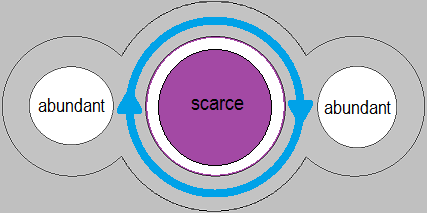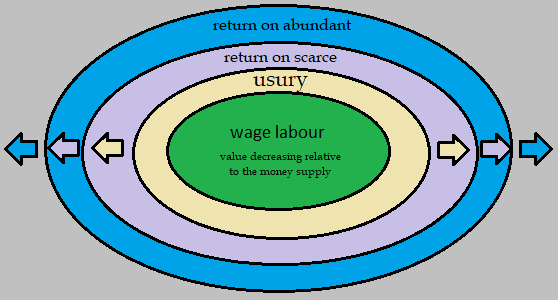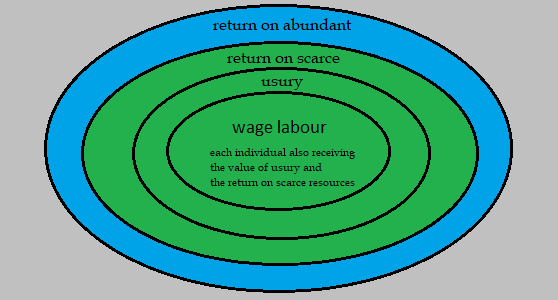The core political problem is the lack of an infinite amount of resources. If we had to our disposal an endless amount of sunny islands with an abundance of nutritious food, there would be little strife and need for organising society. Shortage compel us to organise such as the outtake and use of natural resources. Our task at hand is to find the autonomous way of organising resources, so as to diminish conflict over them. This suggests securing access to resources for everyone in the economy. In measuring our progress, we should focus on the maximising of well-being, and minimising of suffering, of the general population. Western economics exist in the delusion that you can measure the wealth of an economy by its numerical growth. However, the ultimate measure of wealth is well-being; externalities, equality, health, our identity & values, are all important to our well-being. Systems as complex as a society can be counter-intuitive. Beneficial merits for a company within society may be detrimental for society at large. Austerity is beneficial to one person's wallet, but austerity in society creates poverty and suffering. Since wealth is ultimately well-being, working less might create more value, as lack of sleep and chronic stress deteriorates the body & mind. Labour is a large part of our lives, and it's unreasonable to pretend that wealth merely consists of the products of our labour, and not the labour itself. Our work environment, and the meaning we derive from it, is as important to the quality of life as the stuff we can buy after work. Unfortunately, many people see no other option than to live in a busy and stressfull environment, and may not have the capacity or tools to alleviate their situation. The amount of energy and "nutrition" spent at wage labour also determines whether in your spare time you will enrich your life & mind, or, say, vegitate in front of a television. A society immersed in wage labour for the profit of a minority becomes a very unaware society, but it is essential to raise our collective awareness to move from heteronomy to autonomy. The point of this text is to discover the foundation for generating a peaceful, autonomous structuring of society, so it is well that we take a holistic approach. Although increased productivity is welcome when other parameters stay the same (assuming we are aware of them), sheer focus on productivity is ignorant. The goal of life is not how cheap or fast you can get something to eat to increase your time vegetating in front of a television, blocking out whatever problems you have. The goal of life is rather to become more aware of yourself and the world around you, becoming aware of personal and societal problems, and how to solve them, so that we can experience true well-being, which come in the form of prosperity. On the autonomous organising of resources.
The primary purpose of Autonomy is to avoid major conflicts of interest, and this basically refers to the interest for resources in its widest definition, which is also the definition I will be using onward: The conceptual key to organising resources.
resources: anything of value to someone
Also keep in mind that the ownership and management of resources are different dimensions. Ownership does not imply a specific management.first-tier: ownership of resources second-tier: management of resources (third-tier: expenditure of potential revenue)
Now, to make good decisions, we must understand the world around us, which includes having the adequate concepts of describing it. And I believe to have become aware of the most crucial conceptual key for achieving autonomy:RESOURCES IN THE REALM OF HUMAN VALUE <----scarce----availability----abundant----> ('abundant' does not necessarily refer to an abundance in quanta, but to 'something there is not shortage of'.)
Resources have qualitative scalability toward the domains of scarce and abundant. Possible classification:scarce: several minerals, petroleum, waterfalls, the environment... abundant: air, sea water, barren land, human labour, grass, sunlight... (scarce/abundant can be read as limited/universal) (scarce/abundant may differ geographically/culturally)
And in the following, I will argue for this natural ownership:collective<----scarce----resources----abundant---->individual
...as opposed to heteronomous organising:
Discerning between what is scarce and abundant resources, in each respective society, is of course a democratic process. However, it is my conviction that by our somewhat common sense, most resources quite comfortably order themselves along the spectrum of abundant and scarce by themselves. For instance, it is common sense that breathing in air is an abundant resource, and naturally belong to whomever breathes it; and it is also common sense that the purity of air is a collective, scarce resource, such that a private minority must be prevented from building a nuclear reactor that releases plutonium into the atmosphere. [Notice above that the same natural resource can simultaneously represent several types of resources in the realm of human value.]
The ontological, moral and practical reasons for treating scarce and abundant resources differently.
Before delving deeper into my genius solution to organising resources, I must first try to dissolve some philosophical misconceptions that is maybe held by most people. Cause before we can lucidly discuss the ownership of resources, we must first realise what ownership is, ontologically. We must understand that law, rights, and ownership are all fictious ideas. As we learned in the chapter 'Reality', humans are biological patterns actually having evolved from the natural resources we may now claim to own. But our claim of owning something is just that - a claim. We have an idea of why we own an object, but our names and egos are not imprinted into the molecular structure of that object. Ownership is an arrangement. The same goes for rights - they are essentially mental constructs. Rights arise as an agreement between people, and are collectively instituted. We conceptualise rights, and assert power over these arbitrary rights, which is quite different from our cultural impression of rights. The idea that we have rights does not exist beyond our belief. Then what is law? Law comes from power. Whoever has power (consensual or not), determines the Law. The reason why democratic laws makes sense, is that a majority generally has the manpower to do what it wants. So in a peaceful arrangement, a territorial organisation naturally serve the will of the many, as opposed to the bitter few. Law is not required to be altruistic, but an informed, cohesive majority will probably favour laws reflecting the interests of the collective in an equalitarian, principled, and predictable manner, as they all risk to suffer if it is not. What does all this imply? It means that resources does not have to be organised in any particular way. It is unscientific and erroneous to believe that resources should, by some metaphysical justice, be organised such and such. Ownership is, and will always be, a fictious idea. Only if we understand this, are we capable of asking the correct and lucid question: What is a good way of organising ownership of resources? Everything belongs to noone.
Personal liberty is collectively instituted.
"No man is an island." ...John Donne
One more fantasy must be dissolved before we can proceed, especially if there are libertarians or anarchists in the audience. Cause there exists a widespread misconception that if we simply remove government, what remains is liberty. This misconception must be addressed from several angles: Western democracies are founded on the Christian faith and Christian ethics. In recent time, some have officially discarded their faith, but are unaware that they still hold Christian values. Central to the Christian faith is the notion that all humans are sovereign and of equal value. Some delusional people, failing to perceive the underpinnings of their culture and themselves, think that if only we remove the current societal structure, then society will be "free", but still contain the best of values from the structures that they have officially denounced. Wrong. If you remove collective law, you get a lawless society; if you remove collective morals, you get a demoralised society; if you remove all cultural ethics, man is a violent ape. In the real world, beyond the skulls of libertarians and anarchists, 'full liberty' and 'non-regulation' are nonsensical concepts, unless by 'personal liberty' you envision a situation where each person is a King Kong that may smash the world around him to pieces as he pleases. If you tell me you want a truly anarchic society, you suggest that I can knock your teeth out and sell them, or worse, as you have just asked me to treat you like the animal you are. Let us avoid this? A power vacuum is an impossibility. Power is influence, and in human organising, hierarchies of influence always develop. A societal structure is inevitable, so we better make it a good one. Autonomous organising seeks a good portion of self-rule for all, which is a higher form of liberty, as opposed to economic liberty for those who own the most capital. Paradoxically, liberty for all can only be accomplished through regulating liberty. That is, we must regulate through law & power the extent of our liberties. Only by collectively agreeing on the extent of our liberties, will we avoid that the liberties we take quickly infringe on each other. A poor philosopher pursues liberty in an infantile manner, moaning about privatising every resource he can find between heaven and earth. A decent philosopher understands that liberty for all must be engineered and collectively instituted.Scarce resources have inherent value.
"I create nothing. I own." ...Gordon Gekko
Nature was not created by Man, and he should only take credit for transforming it. Scarce resources have inherent value that is not created through the value of work. The extraction and refining of natural resources adds value. Alternatively, human activity may damage a scarce resource. In both cases, a minority is negating the potential value of scare resources, 'de-sourcing' them:extracted resource = unextracted resource + labour OR tainted resource = untainted resource + effect of labour
Scarce resources naturally belong to the collective.
collective<----scarce----resources----abundant---->individual
In using the phrase naturally belong, I am not saying that scarce resources should belong to this or that by some inexplainable justice, but I'm suggesting that there are reasons for it being a fair and utilitarian way of organising resources. And, crucially, this serves the purpose of Autonomy. As no one can own Nature, a fair arrangement among humans in the same ecosystem is naturally that the inherent value of scarce resources belong to everyone. As I mentioned earlier, ownership and management are two different dimensions. Ownership simply means you may regulate something, like restrict or tax the use of scarce resources. You may still, for instance, have private companies compete for contracts for the outtake of natural resources. People definitely need resources to sustain themselves, and when there exists inherent value (for humans) in Nature that no person is responsible for, it certainly makes sense that this value is shared equally by the inhabitants of an ecosystem.Abundant resources naturally belong to the individual.
collective<----scarce----resources----abundant---->individual
Many natural resources that there are little or no shortage of fall into the category of abundant resources, but the greatest chunk of value in this category is labour. If we respect that humans are sovereign and of equal value, then the value of your own work logically belongs to yourself. If the Law does not reflect this, then you have simultaneously introduced slavery - if you tax someone else's labour, that implies that you own their behaviour. Taxing other people's positive work effort - positive in the sense that it doesn't harm others or damage scarce resources - is most immoral. Taxing the outtake of scare, natural resources is not theft. Taxing the value of other people's work is. Also, as well known from economic theory: What you subsidise, you get more of. What you tax, you get less of. A political system that taxes positive work effort is madness, and negates people's potential liberty. The absurdity of taxing productivity might come from the erroneous belief that it is necessary for providing infrastructure, but as we shall see later, the inherent value of scarce resources suffice plenty as collective revenue. A society retaining the value of its scarce resources for everyone, is not required to meddle with people's creativity and productivity, and also avoids the bureaucracy, personal paper work and criminalisation that accompanies the immoral regulation and taxation of people's behaviour. --If you make someone laugh, or give them a back rub, how much of this value do you owe the collective...? As long as people are not harming others or subtracting value from scarce resources, then taxing behaviour does not make rational sense. It is in its nature both unprincipled and corruptible. --Karl Marx was dead wrong on a political body having to "take over all means of production". Trying to assume control over abundant resources, including the value of people's work, not only destroys the incentive of competing to provide ever better value in a market where people's actual needs are reflected by themselves, but is also an arrangement representing the lowest possible level of personal liberty.
The national currency is a scarce resource,and why Watthours is the optimal currency.
An autonomous nation needs a national currency issued through public banking! To explain why this statement is true, we need to start with defining what the optimal currency represents, which is this: A scarce currency.
The ideal currency precisely store the value of work/energy.
Commodities like gold, silver and cryptocurrencies, would work poorly as national currencies, as they are limited and volatile, and because you first have to buy them from the minority holding them before you can trade with it. Debt-based currency is an amazing invention, because you can quickly create currency for as long as you need to exchange value, and then annihilate the debt once all the transactions are complete. But debt-based currency today has a bad reputation because much of the interest goes to private minorities, basically making the interest continuously inflate the money supply. However, this would be turned on its head with public banking: If all the interest on the entire money supply goes directly back to the state to pay for, say, infrastructure, then this would both annihilate the inflation annually, as well as diminish the need for taxation to fund infrastructure (a huge bonus). Inflation/deflation affects the whole money supply, and distorts the units of currency as a store of value. So, while it is not required to ban other currencies, the state itself must secure and support one stable, non-volatile store of value for the national economy. This makes it a scarce resource. Usury is not producing value, but is a necessary aspect of a debt-based money supply - borrowing money gives you an advantage over others (say in purchasing a house) and must come at a price, or it would make sense for everyone to borrow as much as possible, thus super-inflating the money supply. When someone negates the value of the money supply by inflating it (borrowing money), they should simultaneously compensate for this negation by paying interest on that loan, with a fine going back to the collective.Although we remove the inflation of usury by having the government spend - thus annihilate - the interest on the money supply annually, the currency could still be volatile according to the fluctuations of the economy. If there are many public jobs, you can solve the problem of volatility by tieing the currency to standard wages, such that one standard wage is, for instance, always 100.000 X. But an even better solution is found if we visit physics' notion of what work or energy is, namely Watthours. 1 kWh will heat up a room just as much today, as 20 years ago, as 20 years into the future. This makes Watthours the ultimate store of value. And if you tie and adjust the money supply according to the production of Watthours, the money supply can only naturally inflate when there is a greater abundance of energy generated by society. Electricity as currency.
Usury on debt-based currencies traveling to private oligarchies is the biggest scheme and theft of the value of people's work the world has ever seen, and it needs to be replaced with public banking, having the absolute power to create, and charge interest on, the national currency. The financial system is a corner stone in the quest for autonomy. Ironically, partly why we do not muster the surplus awareness of understanding how the financial system works, is partly that our collective attentions are caught up in the personal, financial troubles and scurrying caused by the current financial system. Preferrably we should trade the most universally stable currency - Watthours. This would also yield a bonus to our awarenesses, cause if energy is money, and money is energy, it suddenly grants a lucid comprehension of both. Usury matters much.
The inherent value of scarce resourcesmust flow to everyone!
"He who controls the spice controls the universe." ...Frank Herbert, Dune
The next chapter, "Unconditionality", is devoted to explaining precisely how the value from scarce resources must be distributed to reinforce an autonomous society, but here I will present a general reason for why the inherent value of scarce resources flowing to the collective is the only sustainable model for an autonomous society. I will base my argumentation on this famous equation by French economist Thomas Piketty:r (return on capital) > g (economic growth) = wealth concentration
This is one take on the fact that capital / resources / power tends to concentrate, as we learned in the chapter 'Reality'. Piketty contends that if return on capital is greater than the growth of the economy, then capital ownership will concentrate. Piketty shows through an impressive gathering of statistics that this scenario has been the case for most of the last centuries. The counter-force to this dynamic has been what he calls a "diffusion of knowledge", where for example Europe after WW2 played 'catch-up' to the level of technology of USA, or recently China to the West. Also, in major disruptive events like the world wars themselves, much of the old capital was destroyed, which reset economies. Piketty shows that economic growth in Europe has generally been 1-2%, while return on capital 4-5%. Piketty further suggests that this gradually unequal distribution of wealth causes social and economic instability (which he doesn't prove, although it does harmonise with sociological studies). [BTW I would argue that the occasional changing of the make-up of wealth concentrations is indifferent to the general population / the system as a whole. As example, the problem is not which foreign oil company is receiving the revenue from a developing country's petroleum; the systemic problem is the many consequences from petroleum actually traveling to foreign minorities.] But why is capital held by a minority in the first place? Well, while the masses generally (needs to) trade their capital and pay down mortgages or rent for their housing, concentrations of wealth may continuously reinvest its money, in various ways, to assume an even greater percentage of the money supply. Imagine a big lake, and that this lake represent the entire money supply, which is less than but reflects the value of all the tradeable capital in the economy. Now, there are three ways this lake expands: 1. As pure usury to banks and banking cartels (all money is debt, and the annual interest on the entire money supply is enormous). 2. From issuing money towards the "real growth" of the return on capital from owning and managing abundant resources (stock dividend companies are largely responsible for inflating the money supply). 3. From issuing money towards the "real growth" of the return on capital from owning and managing scarce resources (where ignorant and corrupt politicians have already handed much of the inherent value of scarce resources to private minorities).If wage labour cannot keep up with this inflation, meaning that, despite economic growth, you can no longer swap the same amount of real value for the same amount of work, then the vassal populace will becomes poorer. And this is what has indeed happened in the West, where a day's honest work has given you a little less of the money supply every year that has passed. Even with all our technological advancement, many families are today hard pressed to live on only one wage, something one could do comfortably several decades ago. To organise society autonomously and avoid power concentrations, this dynamic must be discontinued, and can so in a very sensible manner. The inherent value of scarce resources does not derive from the value of work, but naturally belong to the collective. Also, as explained above, scarce resources include the ability to create national currency out of thin air. If - instead of taxing productivity - the collective assumes control of the revenue generated by owning the scarce resources of society, including nationalising banking, then the return on capital from abundant resources will not be enough to destroy the value of people's work: In the above model, usury (from printing money out of thin air) goes directy back to the government, which annihilates it annually, preventing it from inflating the money supply. Then the money supply can only grow by growing the real economy. Piketty's equation will be effectively toppled: r1 (return on abundant) > g (economic growth) + r2 (return on scarce) = wealth concentration
(Unconditionally) distributing the inherent value of scarce resources should have numerous positive effects, as equalitarian societies have less stress, violence and crime. It should also increase the populace's threshold for submitting to corrupt companies and institution, wage slavery or poor working environments. All this simultaneously means increased well-being and awareness. However, creating a fair society is not our primary goal. The goal is to create autonomous societies that does not generate massive power concentrations in conflict with each other. But, if we can make our local, scarce resources absolutely off the table for heteronomous power concentrations, then these resources will not be a drive, fuel or leverage in interest conflicts! We will have taken scarce resources out of the picture, where it can neither empower concentrations, nor make power concentrations resort to nefarious actions to assume control over them. Wealth distribution negates a heteronomous structuring of society in the first place, while absolute local ownership of scarce resources, if achieved, dissipates future meddling by existent power concentrations. The power struggle between the refiners or producers of abundant resources should be less lethal, cause while the way you compete with scarce resources is in gaining control over the scarce resources; the way you compete with abundant resources is to make better use of the abundant resources that everyone has access to (because they are abundant). The struggle to create the best tech product is far less damaging then the struggle to control natural resources. And for this reason, collective control of scarce resources is vital. Of course, if state power itself is corrupted and heteronomous, then we may have come no further! So we will find solutions to the management and expenditure of the inherent value of scarce resources in the next chapter. OFF THE TABLE: The autonomous super benefit from permanent collective ownership of scarce resources.
Coconut Island:examples of autonomous organising.
Welcome to Coconut Island; an island with only 1 coconut tree, but having 4 coconuts. 3 people live on this island, and they decide that whoever has the skill and bravery of harvesting the coconuts, should be rewarded with 1 coconut, while they will share the remaining coconuts equally. What happens in this coconut economy, is this: Inherent value versus value of work.
- One person exploits the scarce resource of coconuts which add negative value to the collective [-4 unharvested coconuts]. - He pays 75% of the harvest as tax for exploiting this resource. [+3 coconuts to the collective] - the 3 coconuts are divided equally among the 3 inhabitants.
Here a very confused person would infer that the collective is stealing 75% of the value of the climbers work. Not so! In reality......the collective defines the ownership of the 4 unharvested coconut. ...the value of the labour is defined as 1 harvested coconut. ...the value of 4 unharvested coconut is thus 3 harvested coconut. 4 harvested coconut = 4 unharvested coconut + labour (extracted resource = unextracted resource + labour)
In other words, the climber precisely returns the negative value he adds to the collective, while the value of his own work is not touched.It happens that the 3 inhabitants on Coconut Island only found a certain part of the island habitable, and as decent, equalitarian people, they decided to split this habitable land into 3 parts. One of them had a great taste for coconuts, so he decided to grow coconut trees all over his land. Another one was attracted to the ocean, and spent his hours catching fish. And the third one was fascinated with the wild boars on the island - he tamed some of them and raised boars on his land. But after a while the coconut farmer got quite tired of only eating coconut, the fisherman got quite tired of only eating fish, and the boar keeper got quite tired of only eating boar. So they had the very good idea of sharing their produce with each other. But wait a minute - shouldn't the coconut farmer share 75% of his coconuts with the collective anyway? In this case no, since that was an arbitrary arrangement based on a previous environment. Now a new environment made the inhabitants define their world in a different arbitrary manner. And the common denominator is that they arranged their society in the spirit of fairness and common sense; an arrangement that benefited both themselves and the community. This new world was defined as such: Scarce resources versus abundant resources.
Scarce resources: - Habitable land (equally split among inhabitants) Abundant resources: - Ability to grow coconut trees - Ability to fish - Ability to raise boars
In this economic system it is recognized that everyone has the potential to either grow coconuts, catch fish, or raise boars. We see that abdundant can mean potentially abundant. Although the fisherman opted not to cultivate his land at the present moment, he does need land to have the ability to do so. Access to habitable or fertile land is here a scarce resource that was democratically & collectively instituted, but the inhabitants then respected each others freedom to do as they please with their land. The collective right to scarce resources and the individual right to abundant resources are both collectively instituted. There exists no rights to begin with. But non-interference is a good solution and natural resting point when collective meddling is tedious or counter-productive or against people's general interest.Unfortunately, new events took place on Coconut Island. For an unknown reason, the shoals of fish had almost disappeared from the coast of the island, and the fisherman could not catch enough fish to sustain himself, let alone share with others. He gathered his fellow inhabitants and asked for their advice. They listened sympathetically and then offered their insights. The coconut farmer was rather obsessed with coconuts, and said 'Let me have your land to grow even more coconuts, and you can help me grow them and share the spoils!' The fisherman thought about it, his stomach growling, and replied that maybe it wasn't such a bad idea. 'Don't be foolish!' said the boar keeper. 'This island belong to all of us, not one of us. What if you want to raise boars tomorrow, but there are coconut trees everywhere that does not belong to you, and coconuts falling on your head? Besides, boar tastes much better than coconuts.' The coconut farmer answered 'That is a lie! You do not appreciate the taste of coconuts harvested at the exact right moment, and also they don't make noises all day like your boars. But I agree on one thing - if you do not have land, you cannot accomplish anything on this land you don't have.' The boar keeper said 'What if simply you come help us out, and we help you out, during these times of trouble, and one day maybe the fish return.' The coconut farmer nodded. This lifted the fisherman's spirit 'You are the best of friends, and the value of your friendship is that of the biggest fish!' he said emotionally. --And so life went on. Sadly, the fish never returned to the coast of the island. However, upon searching for places to catch fish, one day the fisherman stumbled upon some banana trees in a steep hill on the other side of the island. He started cultivating these banana trees on his land, and his bananas became very popular. Thus, a vibrant society once again returned to the island, and its inhabitants lived happily ever after. Permanence.
--The meaning of this story was not to ultimately classify resources (land could be an abundant resource in a scarcely populated community), but to show the interplay of scarce and abundant resources, and to emphasise the importance of retaining scarce resources as a public good. The fisherman was close to becoming the victim of wage slavery in a feudalistic structuring of society, but awareness of how this negates future prosperity saved the day. The point is not that trading labour for products is necessarily a bad thing - only that it is not healthy for the collective (no bananas) or the individual (misery) if individuals have no other realistic opportunity than specific wage labour. Singular work opportunity makes individuals slaves to a potentially bad system that you cannot afford to opt out of.
AUTONORWAY:The untapped potential of scarce resources,and why you don't have to tax labour.
To display the inherent value of scarce resources, we will take a close look at the Norwegian economy, which is the one I'm most intimately familiar with. But to make it more challenging, I will pretend that Norway has zero income from its petroleum resources. I will be using approximate sizes for resources, and their approximate value in Euro (€). A Norwegian case study.
Short statistics on Norway: Population: 5 million Working population: 2,2 million Oversized budget: €150 billion Budget per person: €30.000 Total money supply: €200 billion
Norway's hydroelectric capacity from dammed waterfalls is over 120 TWh annually. Households in Europe pay roughly €0,20 per kWh (industry less): 120 TWh x €0,20/kWh = €24 billion In Autonorway, maybe a third would go to wages and maintenance of damms and electric grid (infrastructure), while the rest would fund other state expenditure. Hydroelectricity (scarce, natural resource).
Other scarce, natural resources in Norway are: Sea food, forestry, various natural stone, various ore, various minerals, and more. We will assume that in Autonorway, all these resources can generate a revenue akin to hydroelectric power of €24 billion. Physical appropriation is not required. The easiest way to generate revenue from the inherent value of scarce resources is to merely tax the extraction, or penalise the tainting, of these resources. It is of course important to conduct such regulation in a principled and predictable manner. Other scarce, natural resources.
In Autonorway the optimal reserve for the national currency is considered to be the Watthours of hydroelectric energy produced by the dammed waterfalls; a solid commodity within its realm. You could adjust debt to the ceiling of a 10-years production of kWh: €24 billion x 10 years = €240 billion (maximum money supply) If we assume 5% interest rate, the money supply generates this usury: €240 billion x 5% = €12 billion Public banking (scarce resource).
1. Companies and individuals borrow €240 billion. 2. They pay €12 billion interest annually. 3. Government spends €12 billion on infrastructure.
Trading Autonorway Watthour-notes instead of fiat currency tied to the illegitimate petrodollar printed by the private Federal reserve in America, will make Autonorway independent of the heteronomous financial institutions that ought to have no business in Norway.Norway taxes the population almost €10 billion for various use of transportation (buying gasoline, cars, using the network of roads, et cetera). Instead we will asumme that Autonorway has a revenue of only €5 billion for penalising ALL tainting of the environment. The environment (scarce resource).
According to government statistics the Kingdom of Norway's revenue from various public services is over €9 billion. Norway is also probably missing out on the opportunity of leasing land to companies or individuals. But we will assume that Autonorway generates only €5 billion revenue for all public services. Public services (scarce resource).
A healthy, independent nation ought to shield itself from currency speculation and international capital scurrying around the world to whereever it can squeeze out the most profit. We will assume this market protection generates a mere €5 billion. Import & export (scarce resource).
The autonomous nation state of Autonorway.
Autonorway budget (not profit): Hydroelectricity: €24 billion Other natural resources: €24 billion Public banking: €12 billion Environmental strain: €5 billion Public services: €5 billion Import/export: €5 billion Sum total: €75 billion / €15.000 per person
Norway's current supersized budget is roughly €150 billion, meaning we have here showed that a large budget can be created from purely the value of scarce resources (not even including petroleum), with zero taxing of the value of people's work, zero monitoring and reporting of income, zero bureaucracy for regulating tax law, and zero bureaucracy for penalising tax fraud. When the collective gives away its collective resources to private minorities, the state must instead use a tremendous amount of energy meddling with everyone's behaviour and productivity, to fund itself. The above demonstration destroys the prevailing idea that taxing the value of work is necessary to generate a substantial state revenue! Also note that, while the budget of Autonorway only reached 50% of the size of the budget of the Kingdom of Norway, money gives you more value when there is zero taxation of abundant resources in the free market.A simplification of different ways of organising resources.
Laissez-faire, feudalistic economy:
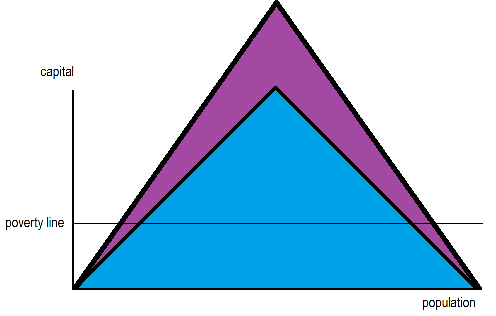
Marxist, centralised economy:
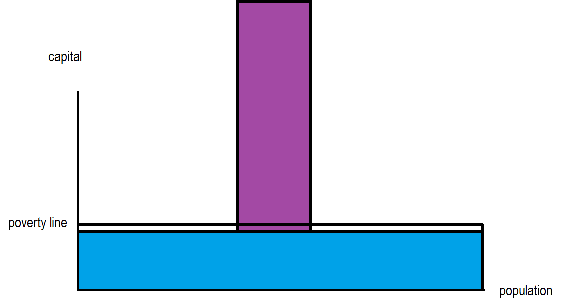
Autonomy, value of scarce resources distributed unconditionally:
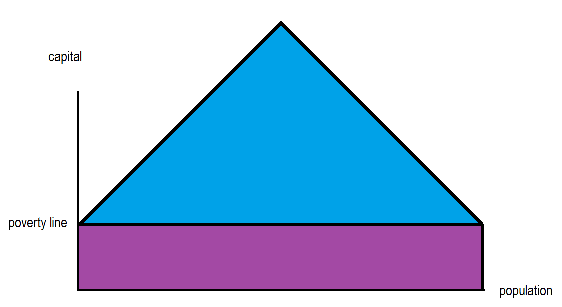
II Unconditional
